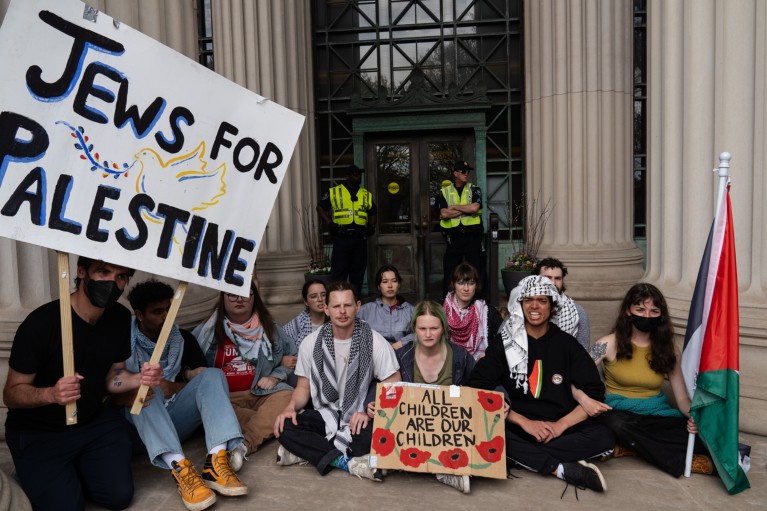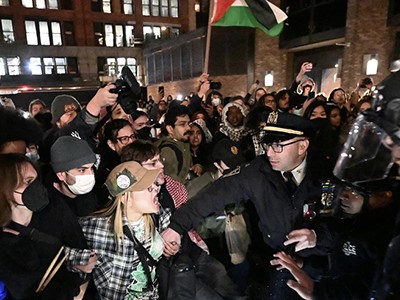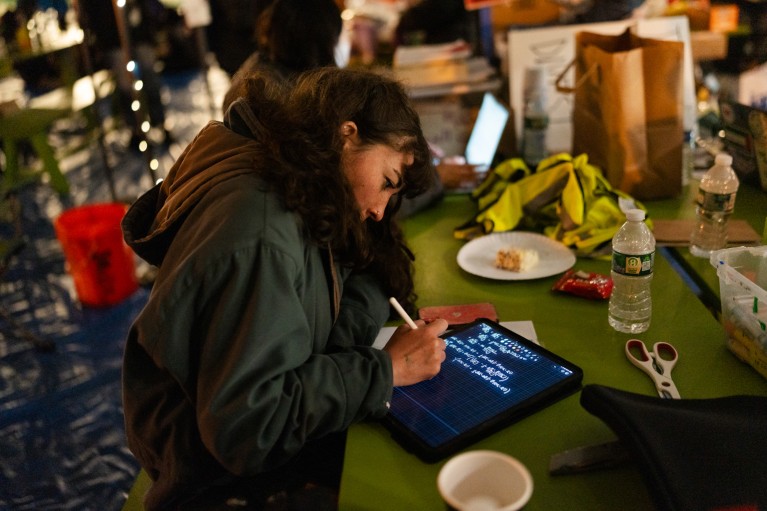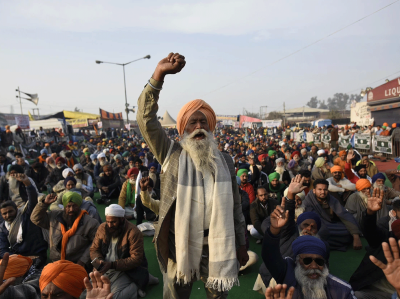
Physics PhD candidate Jessica Metzger (far right) with other pro-Palestinian student protestors in front of the Lobby 7 entrance to the Massachusetts Institute of Technology in Cambridge.Credit: Sophie Park
Jessica Metzger, a PhD student at the Massachusetts Institute of Technology (MIT) in Cambridge, researches non-equilibrium statistical physics — the study of how matter, especially living matter, behaves. Metzger traces her love of scientific exploration to her father, a planetary physicist, and hopes to find a job in academia. But earlier this year, she decided to participate in MIT campus protests against the Israel–Hamas war because, she says, she was horrified by Israel’s bombardment of Gaza. In May, the prosecutor for the International Criminal Court issued a statement saying it had evidence that both Hamas and Israeli leaders had committed war crimes.
Metzger’s goal in protesting, she says, was to push the MIT administration to accept students’ demands, which include severing alleged research contracts with Israel’s Ministry of Defense. MIT currently has three research awards through the ministry, according to a university spokesperson, who said in a statement that getting researchers to terminate continuing projects as a result of such pressure “would be an encroachment on the academic freedom of the principal investigator”.
Metzger was one of about two dozen MIT students suspended in early May for participating in the protests. She was given an interim suspension, her US$4,000 or so monthly stipend was frozen and she was barred from entering campus, attending classes and conducting research until a 23 May hearing, after which she was put on a year-long probation. In a letter to Metzger, the university stated that Metzger had received the sanctions for participating in and expanding events that were unregistered and unauthorized, in campus spaces that either hadn’t been reserved properly or weren’t for use by student groups, as well as for climbing or partially climbing over a fence and for blocking a building.
Some 3,100 students on 73 campuses across the United States have been detained or arrested for participating in pro-Palestinian campus demonstrations between April and July. Campus protests have also spread globally.

Protests over Israel–Hamas war have torn US universities apart: what’s next?
Some Jewish student groups at MIT and other US universities have called the protests antisemitic because participants have allegedly made inflammatory remarks, and say their members feel unsafe on campus. By contrast, other Jewish students at MIT and elsewhere have taken part in the demonstrations, feeling compelled to protest against the killing of tens of thousands of civilians in Gaza, and in favour of human rights. They say that they, in turn, feel unsafe and as if they have been targeted for speaking out against the Israeli government. Nature spoke to Metzger about her decision to participate in the demonstrations and how it has affected her PhD research.
What compelled you to participate in the MIT campus protests?
I had been reading the news about Gaza. There were rumours of direct research ties between MIT and the Israeli Ministry of Defense, and so the MIT Coalition for Palestine research team, a group of graduate and undergraduate students in science and engineering, was interested in uncovering this. That is how I got involved initially, in December 2023.
The physicists who took part in the protests talked about the film Oppenheimer and how the research that we do can have military applications. For example, my work on the collective behaviour of many non-equilibrium objects could be applied to military drone swarms. I’ve become a lot more conscious of the work that I’m doing, directions it could go in and the ethical implications. I think everyone in the research community should be having conversations of this kind.
On 21 April, I joined the protest encampment that went up in front of MIT’s Kresge Auditorium. On 6 May, we blocked the main entrance to the MIT campus, called Lobby 7, and handed out flyers about alternative routes to students trying to access the building. Administrators sent police officers, and they told us to leave. So, within about five minutes of sitting down, we left and it was peaceful. We didn’t resist.
Two days later, I got an e-mail that announced my interim suspension, barring me from participating in classes or research, and was told that my stipend was frozen.
So, at that point, I was temporarily unemployed. I wasn’t getting paid and I had to drop a class in non-linear dynamics, because I wasn’t allowed to finish it. Essentially, I think the reason for this disciplinary action was to deter us from continuing the protests. In my opinion, it has served that purpose.
[Editor’s note: In response, the MIT spokesperson pointed to university president Sally Kornbluth’s general letter to the community on 10 May and summarized: “We need a community where we can all express our views. But we also need MIT to be a place where we all feel safe and free to live, work, and study.”]

Jessica Metzger works on her physics coursework at the protest encampment in May.Credit: Sophie Park
Were faculty members also involved?
Yes. We would like to think that the student movement would be taken seriously anyway, but having faculty present at the encampment really added some legitimacy.
The allied faculty members wrote letters to the administration urging them to come to the negotiating table, to consider the protestors’ demands to sever research ties to the Israeli military — demands that the faculty members said were reasonable and had precedents — and eventually, to drop the disciplinary charges.
How did your hearing with the MIT Office of Student Conduct and Community Standards go?
They were very nice and asked me how I was doing. They also showed me their evidence, photos of me at various protests and a police report, and gave me a chance to clarify what my participation was. I said that I had left the protests when either the administration or the police had asked me to leave.

The Israel–Hamas conflict: voices from scientists on the front lines
I talked about how the suspension had been affecting me, and my research. How this interim suspension was having non-interim consequences on my career. It was limiting me from pursuing unique research opportunities, such as meeting principal investigators who do work that is relevant to mine.
I was in a precarious situation. I was supposed to be doing research to progress in my PhD, but, because the suspension letter said that I couldn’t participate in MIT activities, including research, it was unclear what consequences I would suffer if I did so. For example, I was visiting a laboratory in Paris during May and June to work with collaborators, but I was uncertain whether I would get in trouble, and it was a constant worry.
Are you concerned about repercussions for your career?
Yes, of course, there’s always that danger. I weighed that against the fact that, as MIT students and researchers, we’re really the only people who can apply pressure to change MIT’s policies, especially policies with respect to research ethics.
Regarding the practical consequences, we adopt the same philosophy that US students did in the movements around civil rights and the Vietnam War in the 1960s and 1970s. Historically, most people make it out with their careers intact, but if you don’t, I guess it’s something that you’ll look back on and be glad that you did something about it.
Do you regret participating?
No. Obviously, it’s been very difficult. But I think it’s on MIT that it chose to enforce this disciplinary measure against students who, as far as I could tell, were protesting peacefully. And we knew that we were breaking some rules when we got into this. But it’s not really possible to effect change without breaking rules.
In my view, we had tried all the less contentious avenues that existed, such as contacting the administration. The MIT graduate and undergraduate student associations had passed resolutions and we had been circulating information about those resolutions and our demands to other students and to faculty members. Protesting was the final step.
In the end, yes, I’m suffering negative consequences; I had to work out how to be able to do the research I had planned to do in Paris without getting in trouble during my one-month interim suspension. But I don’t regret it.
[Editor’s note: Regarding disciplinary actions, MIT’s spokesperson said: “As we said last spring, MIT’s emphasis was on a thoughtful and safe pathway toward resolution.” They noted that the disciplinary consequences for continuing to protest were communicated clearly to students.]
You’re now on probation for a year. What effect will that have?
It dampens my ability to participate in civil disobedience in the future. But they can’t stop us from expressing ourselves and campaigning for what we feel is right.

The science of protests: how to shape public opinion and swing votes
Before this, I had not been engaging with anything outside my PhD work. This experience reminded me that there are other things that are important for me to think about as a scientist.
My adviser has been supportive. He’s Parisian and not unfamiliar with student protests. He thinks it’s good that people are protesting against really terrible things. Currently, I’m finishing a paper on exceptions to a long-held principle in physics, known as the ratchet principle, which demonstrates how molecules are transported in living cells. I also attended a workshop in Colorado in July to study self-organized matter and to network with other PhD students and postdocs.
The fact that this is the biggest upheaval that’s happened in my career so far honestly speaks to how lucky I am. All the protestors are keenly aware that early-career scientists in Gaza no longer have functioning universities.




